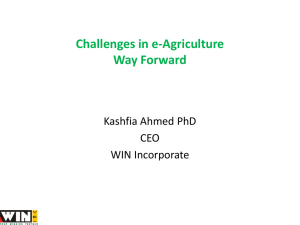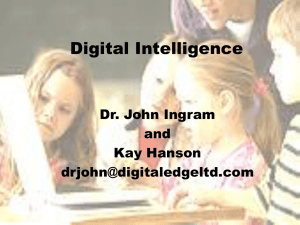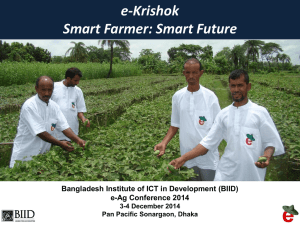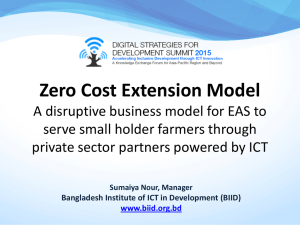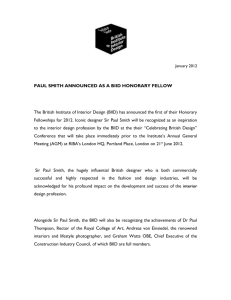Strategic planning for using ICT in extension
advertisement
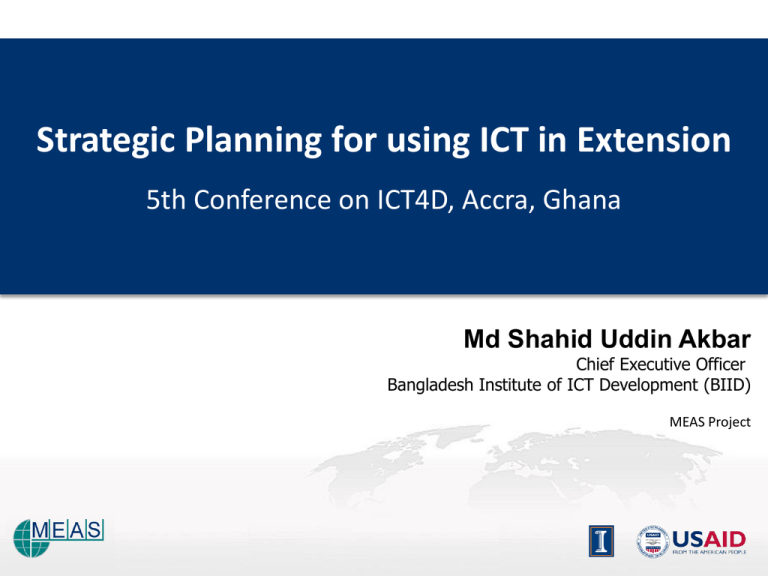
Strategic Planning for using ICT in Extension 5th Conference on ICT4D, Accra, Ghana Md Shahid Uddin Akbar Chief Executive Officer Bangladesh Institute of ICT Development (BIID) MEAS Project Framework of the presentation Strategic Components Understanding the need Analyzing Existing ICT & Extension Trends and Examples Myths and realities Setting objectives & Approach And Future (Expected) Scenario Use of new technologies Assessing the Capacity Missing links Service development & delivery Initiatives Evaluation and development Understanding the Need (Demand Analysis) Awareness and Willingness Social Behavior, Gender, Crops, Environment, Priorities, etc. Information Flows and Institutes Farmer Trust, Acceptability and Credibility Incentives & Business Model Technical Status and Readiness Analyzing Existing ICT & Extension And Expected Future Scenario (Supply Analysis) Mapping existing services, providers & roles Understand the success factors & causes of failure Identify the incentives (Business Case) Capacity of extension dept. & research institutes Quality and validation of content Expected Future Scenario • • • • Need based & trust worthy quality content Packaging (Tool, low cost, access & availability) Market driven and branded services Policy and environment friendliness Assessing the Capacity Service Providers • Institutional : Policy & Resources of Government, Research organizations, NGO’s, Private Sectors to adopt new technology • HR : Awareness, Willingness and Understanding Service Recipients • Farmers: Access, Awareness, Benefits/Results, Skills • Extension : Access to technology, Awareness, Skills, Marketing, Demonstration, Incentives Policy And Regulatory Environment Service Development and Delivery Localization and customization Validation of content and quality Update mechanism and incentives User-friendliness of service delivery (Cost & Technology) Demonstration of Impact and Sharing Success Cases Feedback Mechanism and Development Learning Exchange by The Farmers e-Krishok member farmers from different parts of Bangladesh visit places and share their experiences of usage of ICT and its benefits Evaluation and Development Process Services Were the steps properly followed? How beneficial it is? How did it work? Usage friendliness Take measures to improve the steps Measuring the impacts Myth vs Reality Farmers are not ‘smart’ ICT can solve everything ICT is for the ‘Elites’ Important 1. ICT is only a ‘tool’ and can become an effective enabler 2. Farmers have access to new technology 3. Focusing more on services not in ‘technology’ Setting objectives and Approach Project Driven Initiatives Business Case is not the Priority Rather achieving no.s Financial and Social (Partially) Sustainability Replication and Scaling Up Innovation (Fancy but not doable) Ownership (Till the Project life) Market driven approach led by private sector can be a solution to address these issues e-Krishok: An ICT enabled service • BIID has been facilitating proper usage of the first and only (as of now) private sector driven provision info bank (www.ekrishok.com) of agriculture related information and knowledge. • Based on the experiences of piloting in 10 locations in 2008, BIID is now expanding the service as ‘eKrishok’ nationwide to induce trial of agricultural extension and market linkage service. • BIID now introduced short code 16250 to offer voice & SMS service Mobilizing and awareness building - Recognition of info-centres as source of Info and advice - Trial of services by member farmers Problem specific consultation - A critical mass of benefited farmers Backend support services like content, promotion, marketing e-Krishok: An initiative of BIID Inclusive Business Concept (Service & technology adoption, Scaling up) Innovation, Strategy and Business Model (Envisioning the future market of ICT in Agriculture) Using new Technologies • • • • Mobile Phones – Voice, Transaction VAS (Call Centre, SMS) ICT enabled Shared Access Points Internet – Web : Contents – Social Media : Face Book, Twitter, YouTube – Communication : Email • Community / FM Radio • Television Missing Links Missing Links 1. Supply driven approach 2. Lack of integrated and coordinated initiative 3. Gap in understanding local dynamics and social behavior 4. Respect and partnership among relevant stakeholders 5. Relationship between farmers and service providers (Input, Market and Extension) 6. Flow of information between field and research USAID’s Work in ICT and Extension mFarmer: USAID/Gates/GSMA) • Four challenge grantees to reach 2M farmers • Learning, TA, toolkit • www.gsma.com/mfarmer FACET – ICT and AG • Learning: briefing papers, webinars, toolkit • Short term TA • Workshops • www.ICTforAG.org MEAS - Modernizing Extension and Advisory Services • Synthesizes lessons learned on extension • Disseminates training materials and good practice • Assists in analysis and design of extension investments • www.meas-extension.org Thank You Terms of Use © Author, Institution, MEAS project. This work is licensed under a Creative Commons Attribution 3.0 Unported License. Users are free: • to Share — to copy, distribute and transmit the work • to Remix — to adapt the work Under the following conditions: • Attribution — Users must attribute the work to the Andrea Bohn but not in any way that suggests that she endorses the user or the user’s use of the work). Disclaimer This presentation was made possible by the generous support of the American people through the United States Agency for International Development, USAID. The contents are the responsibility of the author(s) and do not necessarily reflect the views of USAID or the United States Government. Consortium Partners SAFE MEAS This is a Leader with an Associate (LWA) Project funded by Goal: to help transform and modernize extension and advisory systems, so they can play a key role in both increasing farm incomes and enhancing the livelihoods of the rural poor, especially farm women. Project Objectives: to define and disseminate good extension management strategies that will help establish efficient, effective and financially sustainable extension and advisory service systems in selected developing countries.


